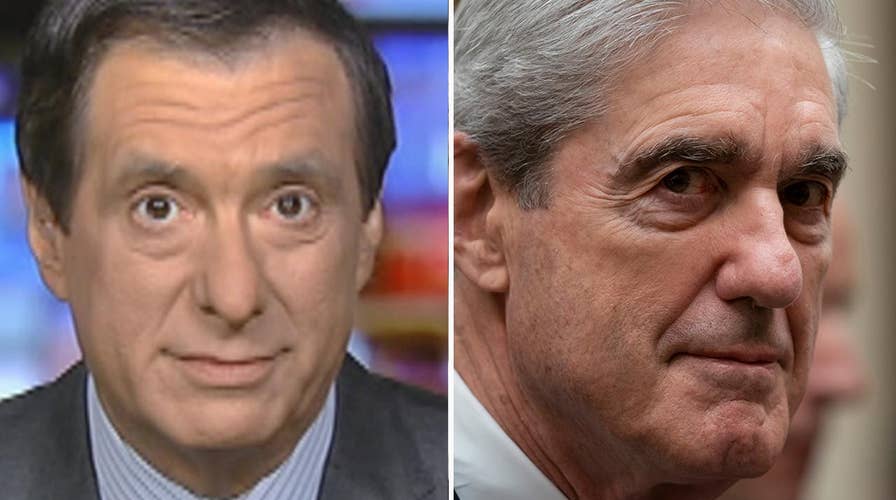Howard Kurtz: Despite the media hype, a reluctant Mueller frustrates both sides
'MediaBuzz' host Howard Kurtz weighs in on how Mueller's testimony before two Congressional committees fell flat.
It wasn’t just a dud. It was a complete bust.
My expectations were extremely low for the Robert Mueller hearings, but I didn’t think it would be this kind of train wreck—or that the storied prosecutor would be such a stumbling witness.
This was a huge letdown for the Democrats, who hoped that Mueller would help them dramatize his findings about President Trump in a way that would transform public opinion.
But the combination of Mueller’s halting performance, cautious replies and moments of confusion made that all but impossible.
The Democratic mantra heading into yesterday’s sessions was that for most Americans, they didn’t read the book, but they would watch the movie.
The problem is that Mueller turned out to be a terrible leading man. He kept fumbling his lines, asking lawmakers to repeat the questions.
In fact, he seemed to shrink as the House Judiciary hearing dragged on. The members grew louder as they spent more time in partisan speechifying, and his voice often turned into a low mumble. They were using him as a prop.
Mueller’s non-responsiveness was frustrating for the Republican lawmakers as well. But since they were playing defense and didn’t want the hearing in the first place, it was basically a wash for the GOP.
SUBSCRIBE TO HOWIE'S MEDIA BUZZMETER PODCAST, A RIFF OF THE DAY'S HOTTEST STORIES
The onetime FBI director remained calm even when asked whether his probe was a witch hunt, the phrase popularized by Trump. The one time he seemed exercised was when Republicans accused him of mainly employing donors to Hillary Clinton and the Democrats. Mueller said he had never asked a prosecutor his or her political affiliation.
Mueller used the opening of the House Intel hearing to clean up one of his answers from the Judiciary proceeding. He had agreed with Democrat Ted Lieu, who cited DOJ’s Office of Legal Counsel in saying “that you did not indict Donald Trump because of the O.L.C. opinion stating that you cannot indict a sitting president.”
Mueller said at the second session: “What I wanted to clarify is the fact that we did not make any determination with regard to culpability in any way.”
As Mueller tripped over his words and deflected inquiries by saying “I can’t speak to that” and “would have to refer you to the report,” many pundits said he seemed slow, confused and befuddled.
Maybe, at 74, the former special counsel is not as sharp as he once was.
But I found some of the criticism unfair. Mueller was being asked rapid-fire questions about specific passages in a sprawling report assembled in part by his deputies, knowing that he’ll be pounded if he utters one wrong syllable.
That partially explains why he kept hesitating until he could review the sentences in question.
Overall, the Democrats tried to get Mueller to discuss damaging material on Trump, while the Republicans challenged the origins of the investigation, the writing of his report and whether he was qualified to be special counsel. Both sides tried, and failed, to get the witness to endorse their points.
Judiciary Chairman Jerry Nadler got Mueller to say his report does not support Trump’s claim that it “exonerated” him. Nadler also got Mueller to say that the report did not conclude that Trump didn’t commit obstruction of justice—as it explicitly said four months ago.
While Nadler broke no new ground, he concluded his questioning by declaring “anyone else would have been criminally prosecuted.”
Republican John Ratcliffe lectured Mueller for detailing the probe of alleged obstruction, saying this violated the terms of his appointment, since he made no decision on prosecuting, based on Justice Department guidelines.
The president isn’t above the law, Ratcliffe shouted, but “he damn sure shouldn’t be below the law.”
Despite earlier hints that Democrats would have the former FBI director read from the report for theatrical effect, they didn’t do that. Instead, they would read what they viewed as incriminating passages themselves, and Mueller would tersely assent: “That’s in the report, yes.”
When Republicans tried to lead Mueller into talking about the Steele dossier or Fusion GPS, Mueller would say: “It’s outside my purview.”
Even with Louie Goehmert thundering that Mueller should have handled rogue FBI agents Peter Strzok and Lisa Page differently—"You perpetuated injustice!”—Mueller calmly explained he had Strzok transferred upon learning of his anti-Trump texts.
Under Democratic questioning about Trump privately dropping an F-bomb and saying Mueller’s appointment meant the end of his presidency, the ex-Marine remained clipped in his reaction.
In short, Bob Mueller did what he said he was going to do, repeatedly invoking the report, and largely refusing to go beyond it.
His affect was flat. It was clear he didn’t want to be there.
The net effect is that Democratic and Republican lawmakers posed their questions and made their partisan cases with little cooperation from the much-anticipated witness.
With his sometimes monosyllabic responses, Mueller refused to be used as a prop for either side.
In a Fox News poll, 49 percent said there was no chance that Mueller’s testimony would change their view of Trump, while 23 percent said there was a small chance, 11 percent some chance and 8 percent a strong chance.
CLICK HERE TO GET THE FOX NEWS APP
If the Democrats were counting on the televised spectacle to dramatize Trump’s conduct, even a generous observer would have to say that they failed.









































